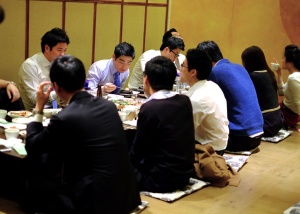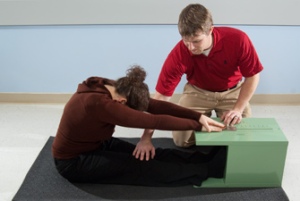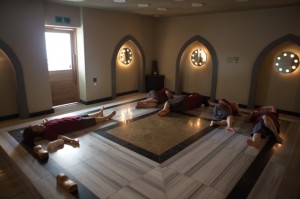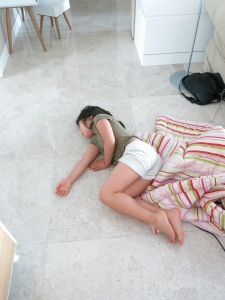From February to June 1787, with all of his necessities packed in a single trunk, Thomas Jefferson traveled “incognito” by coach, barge, and sometimes mule across most of France and Northern Italy. Reading the extensive diary he kept of the trip, one encounters many passages like the following.
In the boudoir at Chanteloup is an ingenious contrivance to hide the projecting steps of a staircase. Three steps were of necessity to project into the boudoir. They therefore made triangular steps, and, instead of resting on the floor as usual, they are made fast at their broad end to the stair door, swinging out and in with that. When shut, it runs them under the other steps. When open, it brings them out to their proper place.
 I don’t quote this because it was Jefferson’s most electrifying prose; it’s not, and to be fair, he never intended to publish it. What is striking about the diary is what it says about Jefferson’s sense of the grand purpose of travel, evidenced by the wealth of detail describing everything from soil types, methods of grape cultivation, the relationship of social conditions to regional crops, and sketches of practical contraptions like the one above. Every page reveals a man bent on devouring as much practical information as he could with an eye toward using it to improve both himself and his country on his eventual return to Virginia. In addition to scouting markets and securing contacts for American agricultural producers (which were his primary duties as a minister), he brought back with him new varieties of plants, architectural designs and ideas he would later implement, plans for technological devices, and an unparalleled expertise in European wines and viticulture. Not too shabby for an 18th century backpacker.
I don’t quote this because it was Jefferson’s most electrifying prose; it’s not, and to be fair, he never intended to publish it. What is striking about the diary is what it says about Jefferson’s sense of the grand purpose of travel, evidenced by the wealth of detail describing everything from soil types, methods of grape cultivation, the relationship of social conditions to regional crops, and sketches of practical contraptions like the one above. Every page reveals a man bent on devouring as much practical information as he could with an eye toward using it to improve both himself and his country on his eventual return to Virginia. In addition to scouting markets and securing contacts for American agricultural producers (which were his primary duties as a minister), he brought back with him new varieties of plants, architectural designs and ideas he would later implement, plans for technological devices, and an unparalleled expertise in European wines and viticulture. Not too shabby for an 18th century backpacker.
Despite competing with the leisure travel industry for our hearts and minds, the idea of traveling to improve one’s country is still discussed today, though it more often falls under the purview of travel scribes than presidential hopefuls. One of the most vocal and visible contemporary champions of what you might call national-improvement travel is the writer and entrepreneur Rick Steves. In his recent book, Travel as a Political Act, Steves explains the book’s eponymous theme thus:
When we return home, we can put what we’ve learned – our newly acquired broader perspective – to work as citizens of a great nation confronted with unprecedented challenges. And when we do that, we make travel a political act.
Steves’s notion that travel can improve one’s country echoes Jefferson, who wrote to his nephew in 1787 that “men of a sober age” could travel to “gather knowledge, which they may apply usefully for their country.” There is however an important difference between them: The country Jefferson came home to was agrarian, weak, and relatively undeveloped, so many of his observations found an appreciative audience among a people who felt they had something to learn from Europe. In contrast, Rick Steves has to chip away against the popular conceit that America is exceptional and has little to learn from Europe – least of all the French, whose label as “cheese-eating surrender monkeys” has been un-ironically accepted as the last word on France by the millions of FOX viewers who never quite grasped that learning international studies from Homer Simpson is a bit like learning feminism from Archie Bunker.

So like, oh my god, I have to tell you about this thing they use in Europe called the metric system…
But like Jefferson, Rick Steves is also a man fired with missionary zeal. In the book, he writes cogently about successful heroin maintenance programs in Switzerland, Sweden’s commonsense approach to underage drinking, the liberal stance toward prostitution in the Netherlands, and several other battle-tested European social policy triumphs. This is well and good until one recalls that Europe is no longer some distant land from which letters take weeks to arrive and none but seamen, diplomats, or the very rich will ever see in person. Another difference between Jefferson’s time and our own is that the traveler coming back from Europe today isn’t really telling people much that they haven’t already heard.
So if we know about these things, why don’t we implement all these great ideas? Part of the answer lies in yet another important difference between the worlds of Jefferson and Steves: today’s traveler is sharing his European insights with countrymen who are too often hypersensitive to criticism (Love it or leave it!) and who seldom give a hot damn what Europeans do, think, or say. While some of Jefferson’s contemporaries may have replicated the “ingenious contrivance” he observed in the boudoir, today the phrase “solution X has worked in country Y” is rarely the premier feature of a persuasive discourse or a winning debate.
You don’t even have to look as far as Europe to overlook an idea. Case in point, socialized medicine in Canada. You can be for it or against it – and I frankly don’t care which – but one thing that should be very clear by now is that its implementation doesn’t lead down the dreaded “slippery slope” to inevitable and abject totalitarianism, as many Americans strangely imagine despite overwhelming evidence to the contrary. For some Americans this is as easy to debunk as literally looking out the window (there goes Sarah Palin’s excuse), yet to point out that Canada has socialized medicine but no dictatorship is to be cheeky or obtuse, not a Jeffersonian visionary.
No doubt mindful of these obnoxious tendencies, Steves is obliged to draw doomed analogies between constructive personal criticism and criticism of one’s equally beloved country:
I enjoy bettering myself by observing others. And I appreciate constructive criticism from caring friends. In the same spirit, I enjoy learning about my society by observing other societies and challenging myself to be broad-minded when it comes to international issues.
I’d be out of my depth to deal with the question of whether the average person strives to better themselves, but even among people who do, this is a leap that many still don’t make. Whatever the reason for that, it leads me back to a pet peeve of mine regarding some of the grand claims that are occasionally made in praise of travel, namely, the idea that the inevitable consequence of travel is growth, openness, or some other species of personal improvement. While it appears to make intuitive sense, the continuing struggles of people like Rick Steves to invite their fellow Americans to brook even well-intentioned and thoughtful criticism suggests to me that there are in fact prerequisites to this happy side-effect – call it  humility or openness if you like – and that travel does not necessarily teach us those things. Traveling certainly affords the opportunity to learn, but in order to learn something it seems we must first acknowledge that we have something to learn in the first place. Without that, the opportunity is wasted, as evidenced by every self-assured ding-dong, dipshit, and dunderhead who strapped on a backpack and came back with his ignorance intact.
humility or openness if you like – and that travel does not necessarily teach us those things. Traveling certainly affords the opportunity to learn, but in order to learn something it seems we must first acknowledge that we have something to learn in the first place. Without that, the opportunity is wasted, as evidenced by every self-assured ding-dong, dipshit, and dunderhead who strapped on a backpack and came back with his ignorance intact.
I’m not saying that travel has not cracked open a stubborn nut here and there and managed to ram home an essential truth, welcome or not. That happens, though it strikes me as less common. It’s also not hard to find examples of travel gurus (Steves is one) advising us to open our minds prior to traveling in order to get something out of the experience. In other words, we generally become travelers by becoming open, but you can’t count on it happening the other way around.
If our goal is to better our country, is there still a point to purposeful travel, or is bettering ourselves the best we can do? And if openness is the main requirement to do that, does travel need have any role in that at all?
The big question seems to be: how do you learn openness? I don’t really know, but I’m pretty sure that if you’re headed into a boudoir in Chanteloup, you want to be ready for anything.














